BlobBackup is an open-source, cross-platform, and easy-to-use backup program that optionally supports cloud services
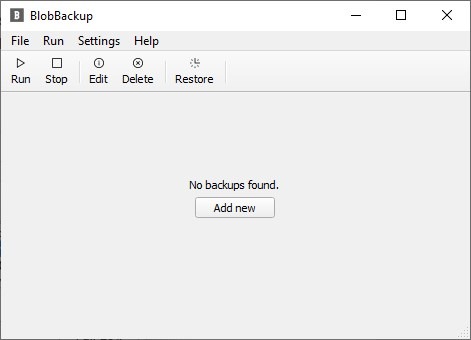
Do you backup your data? You should, as you never know when it might come in handy. Some people like having a backup readily available on a hard drive, while others prefer a cloud-based solution that they can access from other devices.

BlobBackup is a backup program that provides the best of both worlds. The application has a user-friendly interface without a toolbar or flashy colors.
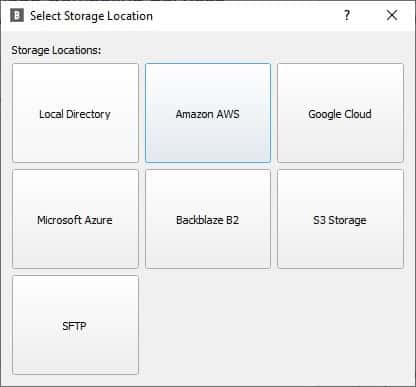
To get started, click on the add new button in the middle of the window. The program supports local backup, network drives, and cloud storage services including Google Cloud, Amazon AWS. Microsoft Azure, BackBlaze B2 and S3 Storage.
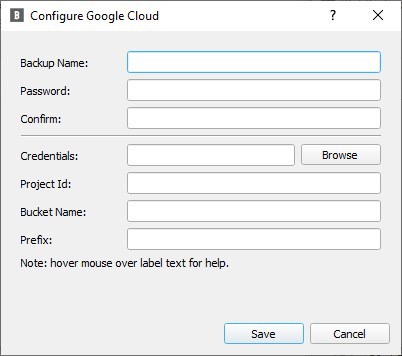
We'll be focusing on the local storage backup here for simplicity. Select an option and BlobBackup will prompt you to enter the name for the new task, and a password to encrypt the files (256 bit AES in GCM mode). For local storage drives, you'll need to select the directory in which the backup should be saved to, aka the destination folder.
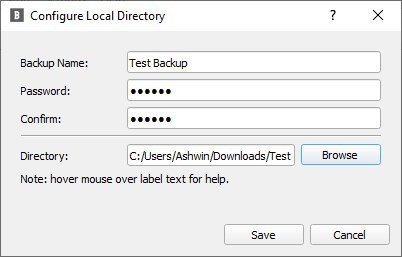
The network/cloud backup methods require you to configure (authenticate) the program with your account. I recommend selecting an external hard drive (or a different internal drive) as the backup's destination if you pick the local option. In the next step, a new window appears with options for selecting the folders that you want to back up, i.e. the source directories.
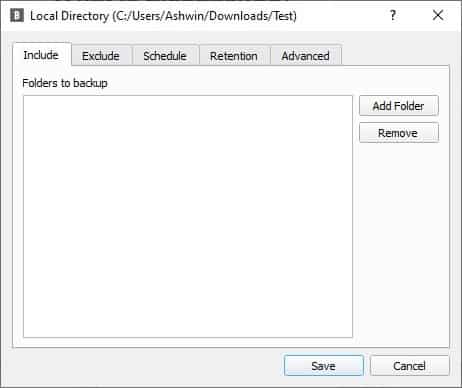
BlobBackup doesn't have an option to select individual files. The program supports recursive folder by default, but it does allow you to exclude file types from the backup using wildcards.
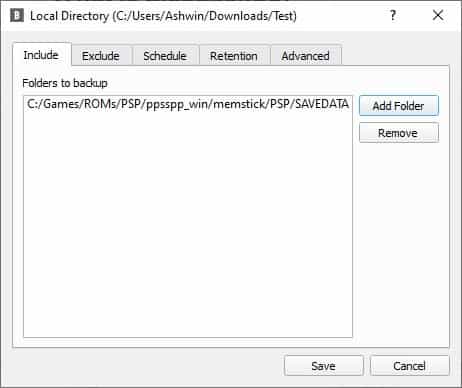
Backups can be scheduled to run automatically at a given time, every day/hour, or just on specific days of the week. If you don't want to automate the task, you can choose the manual backup option. The next screen is called Retention, and is used to define the number of days that the backup data should be retained before it is deleted. BlobBackup runs in the background (to trigger scheduled tasks), and can be accessed from the system tray.
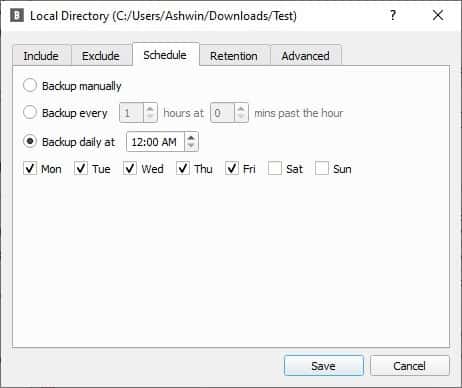
The last tab in the configuration window is named Advanced, and has options to select the number of threads /(to be used for running the task), and the compression level (Zstandard). You can ignore these settings if you're not familiar with those terms.
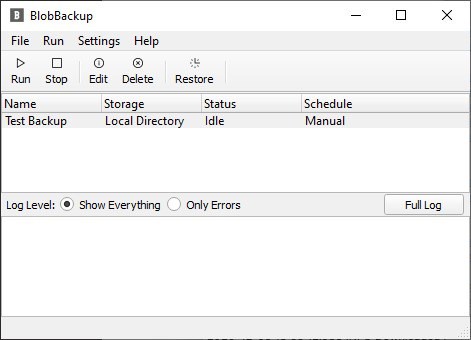
Click on the save button and BlobBackup will create the task and list it on the main screen. To run it manually, select the task and hit the Run button on the toolbar. The program will begin backing up the files and displays a log in the bottom pane to indicate the status. A notification will pop up in the action center to tell you whether the task was completed successfully.
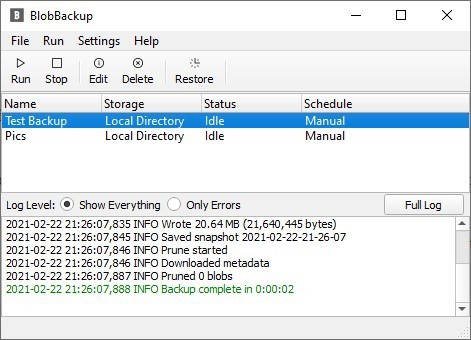
To edit a backup's settings, use the Edit button on the toolbar or double-click the task in the list, you'll need to provide the password to access the task's options. The toolbar also has buttons to stop an ongoing backup, delete a task, or restore data from a previous snapshot.
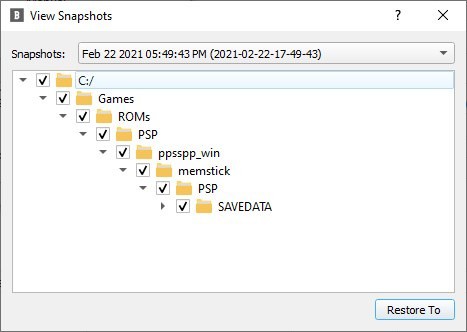
Select the backup's snapshot, and you'll be able to choose specific sub-folders that you want to restore the data from. Make your selection and click on the "Restore To" button, to save the data at any folder of your choice.
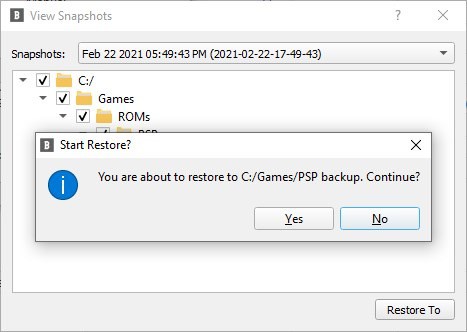
BlobBackup is an open source program. It is available for Windows, Linux and MacOS. The program requires about 173MB of storage space. For an application that's still in beta phase, it is quite promising, but not yet ready for installation on anything but test machines.


























Significant limitation: permissions error reading
*users/*/NTUSER.DAT
Essentially appearing to indicate the app cannot back up some files the current profile session is using.
That suggests BlobBackup is limited by not using the Volume Shadow Copy service, doesn’t it?
Otherwise, a quite impressive effort. Couple of tiny tweaks to the dialogs and perhaps a toolbar button for “Add new backup” and this tool does seem to have promise. Adore the support for SFTP which is all too rare or a freemium feature.
The UI is a blatant rip of the Bvckup 2 interface. Well done.
https://bvckup2.com/img/bvckup2-screenshot.png
The design language very strongly resembles that of Bvckup but it doesn’t seem to mimic the same efficiency and the functionalitu doesn’t seem nearly as clever and well thought out.
Also not bloated like BlobBackup. I might give Bvckup a test run.
These backup programs are useless unless they retain historical versions of files (modifications and delete retension). If your source data gets corrupted it will just overwrite the backup with with these corrupted files. Been looking for a free or low cost alternative to products like crashplan, zoolz, backblaze.
That’s true. But it’s also needed against ransomware. Only having a local backup won’t help against malware/theft/fire. Local backup isn’t an alternative to online backups.
There’s the 321 rule. 3 copies. 2 backups. One local and one offsite. 3rd being the original copy.
Maybe have a look at ARQ backup.
Bvckup is also an option. Versioning (previous versions if the same file) is supported but still to a limited degree.
Bloated for something so simple (172 MB) and confusing backup file structure. Creates bunch of sub folders and files. Surely will fail when restoring.
Wow. you are such an expert. I will totally trust your wisdom.
But… but… the website calls it “this adorable little guy”! Seriously, I totally agree. 172 mb is WAY too large for such a program.
I tested the v1.0.0.beta2 version of the software on Windows XP Professional with Service Pack 3. Unfortunately, the software does not work and a “not a vailid Win32 application” error is provided.
I also note that the “BlobBackup_linux_v1.0.0.beta2.zip”, “BlobBackup_osx_v1.0.0.beta2.dmg.zip”, and “BlobBackup_windows_v1.0.0.beta2.zip” are part of the “v1.0.0.beta1” offering on the releases ( https://github.com/bimbashrestha/BlobBackup/releases ) page.
Thanks. Looks promising for specific jobs and has some nice abilities. Can’t understand how retention actually works though. The official documentation is sparse.
Well indeed an interesting open-source program.
I personally use several depending on my need.
O&O Diskimage for weekly (or major changes) of all my rigs. (to external HD)
O&O Auto Backup for some folders for on the change back-up (to external HD)
SyncBack for some ftp and rig to rigs on some gov. and local network.
Have Cyberduck, but just haven’t really put it to use much. Though donate due to it being worthy project.
So now I guess I’ll download and play with this one out of curiosity. . . and who knows where that will lead to in quest of backing up files.
Either way thanks Ashwin for the review.
Heidi-Ann
Why does anyone care if you donate to Cyberduck? It’s a decent program but nothing spectacular imo. Can confirm O&O software is good stuff, I recommend as well.
I care abut Heidi-Ann donating because I want you to know not everyone thinks like you and I find it interesting to know whether and why people donate to ‘free’ software projects because there is no such thing as “free software”, only “volunteer developers”. Slowly but surely though, people need health care, roof over their heads and so forth. Yep, even developers!
Please have a little more respect for the efforts and altruism of volunteer developers, and those mature enough to understand nothing is free so donate in appreciation, put into our digital lives.